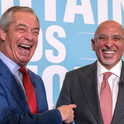The current late-1940s chamber of the House of Commons is not that old (and is younger than, say, Kenneth Clarke or Margaret Beckett), but it was consciously modelled on the chamber that stood when Britannia ruled the waves, and walking around the Palace of Westminster and its environs one is constantly reminded of Pitt and Fox, Peel and Palmerston, Disraeli and Gladstone. Watching over parliament from the square outside is the imposing statue of Churchill. Squint and you too could be at least a hundred years away.
But in this present day, Westminster and Whitehall—and Fleet Street—are no longer configured for the United Kingdom’s place in the world. And this is not just in terms of constitutional processes and accountability; there is also a mismatch between the seriousness with which we should engage with international affairs and our obsession with the Westminster village.
Take, for example, the Scottish National Party’s parliamentary motion this week for an immediate ceasefire in Gaza, set for one of their few opposition day debates. Quite quickly, what could and should have been a solemn debate converted into an ugly political squabble about procedure and the respective rights and privileges of Westminster parties.
The parliamentary debate became about us, and not about those who are suffering and what, if anything, could be done about it. There was almost no practical consideration of the United Kingdom’s role in the conflict, our approach to resolutions in the United Nations, our use (and lack of use) of measures to curb the flow of weapons, and so on. Our lobby-focused news media then had no real alternative but to report this as a domestic political fiasco.
What the United Kingdom could actually do in respect of what many see as disproportionate and indiscriminate use of force by Israel was hardly mentioned in the media reports of the debate, and it certainly was not uppermost in what was being discussed the day after. The headlines were instead about the procedural decisions of the Speaker.
Here the Speaker did err, for what it mattered. The effect of his decision to allow a vote on a Labour amendment was to rob a large opposition party of a rare opportunity to put forward a motion entirely on its own terms. The SNP are entitled to be aggrieved.
But given the topic at hand, the absolute political and media preoccupation with this error seemed crass. The important thing was that there was a vote on whether the United Kingdom should be calling for a ceasefire, and not which party could take the credit. The focus should have been on Gaza. But, as with Brexit, we find the soap opera of Westminster easier to follow and understand.
Parliamentary rules and procedure, like court rules and procedure, do matter—but they are the means to an end, and not an end in and of themselves. When the political and media anger is directed at a Speaker, rather than at what was to be the topic of the debate, then parliament becomes like something that Jonathan Swift would have described in Gulliver’s Travels: we look like the parliament of Lilliput.













